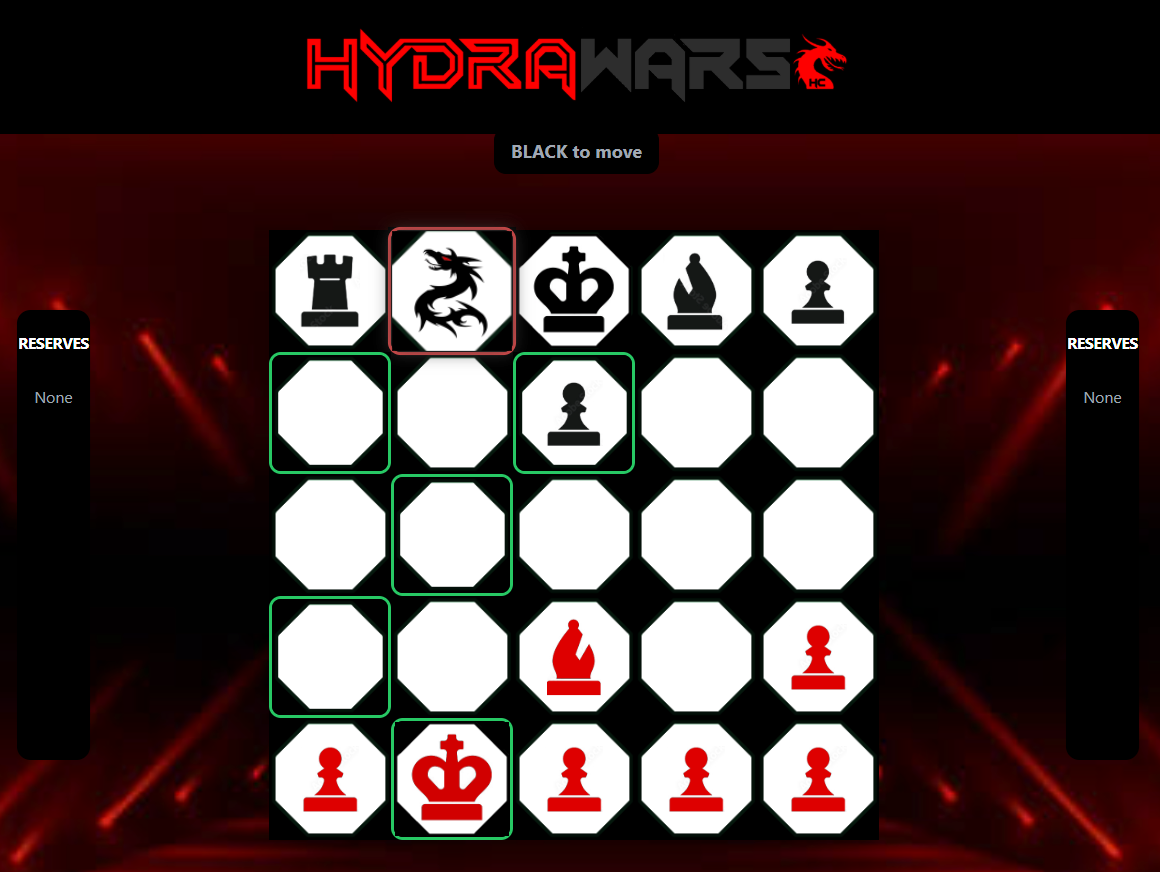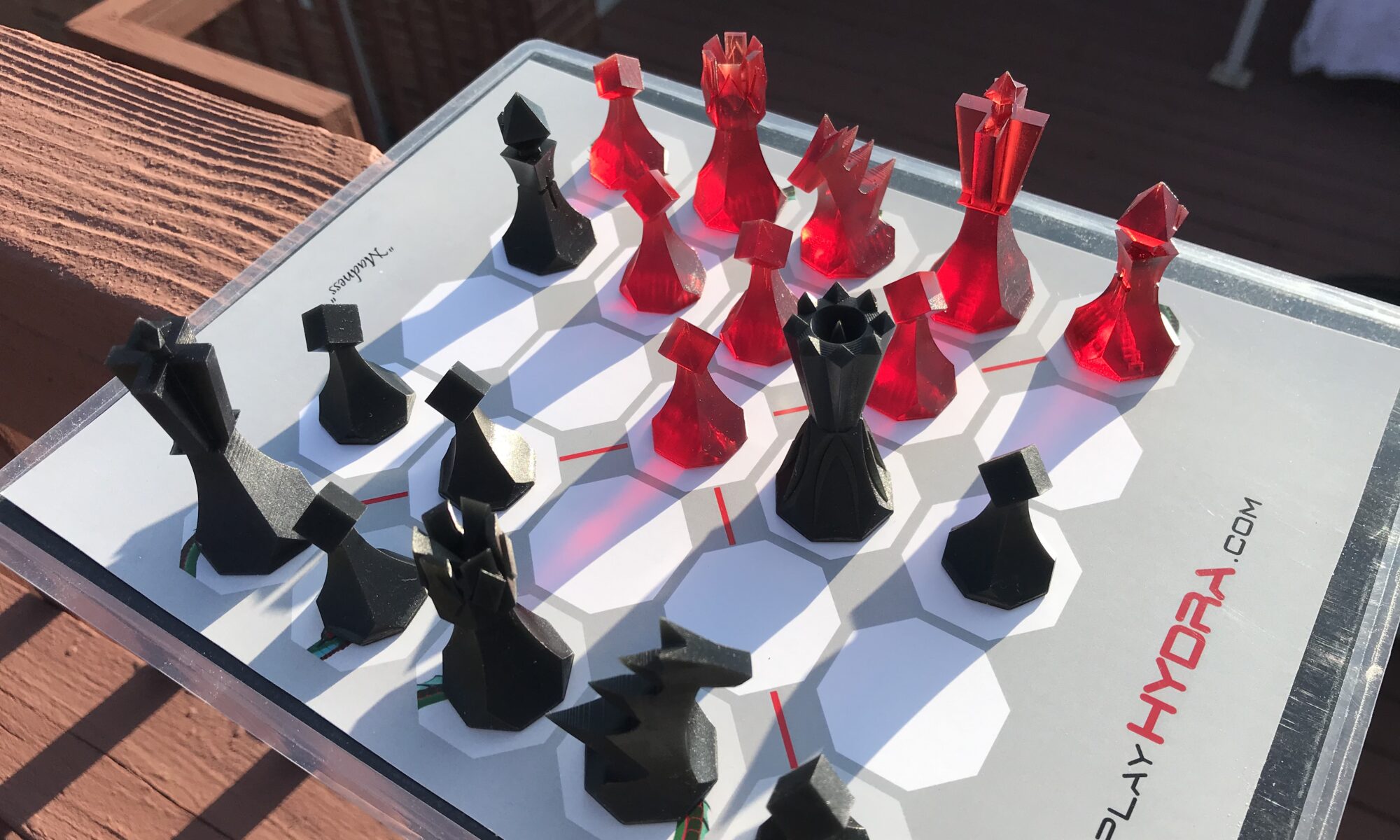What’s the biggest difference between Hydra and classical chess?
Since pieces move just as they do in standard chess, the most noticeable differences in Hydra are the smaller board size and the random introduction of pieces, which create terrifying and unpredictable scenarios you’ll never encounter in regular chess. It’s the thrill of overcoming surprises you never conceived of or, conversely, the challenge of maintaining a temporary advantage long enough to capture a king.
Except for the back rows HYDRA is essentially* standard chess, so the most important thing to understand is how the back rows affect play. The most dangerous fact about your back row is that when one of your pieces leaves it to escape attack, whatever piece populates that octagon immediately after is a sitting duck. And if it’s your king, YOU’LL LOSE THE GAME. There is no “check” giving you a chance to move out of danger. Keep this in mind. Before moving a threatened piece off your back row always note the pieces remaining in your reserve pool (unless you are feeling lucky!)
* essentially – the smaller board leaves less room to escape, forcing more kills than in classical chess.
.
.
OPENING STRATEGY — Selecting your first 5
The goal (obviously) is to avoid a significant starting disadvantage.
It’s generally a liability to have a king on the board early. If your king is on, you’ll take the first move (if you are smart). Before each move securing your king should be your first thought.
A queen is not necessarily an opening advantage, unless your opponent’s king is on the board.
Pawns tend to be an advantage at the start of a game – expendable and effective.
Due to the short board, never underestimate the threat of a knight’s opening move.
.
.
HYDRA-castling — First come, first served.
If you’re playing HYDRA you enjoy beating the odds more than having a fair chance at winning. Congrats, that’s what heroes are made of.
Now, due to chance, you find yourself near the start of the game with the only king on the board – or with your opponent hunting your king with the only queen in the battle. Luck appears to have turned her back on you (for the moment). But since Fate has dealt you the greatest vulnerability, Fortune will throw you a single lifeline – the option to castle. Even so, statistically speaking you remain at a disadvantage, and should use that sole lifeline wisely. Here are some tips:
Remember that your option to castle expires the moment your opponent’s king appears on the board (unless he also has the only queen on the board).
You can castle to escape check, or checkmate, or merely to gain a strategic advantage. Keep your eyes open for such an advantage.
If you still feel that, regardless of other variables, it’s patently unfair for only one king to be visible, never forget how unstable the board configuration is, and that it can just as quickly prove a bigger disadvantage for your opponent not to know when, or under what circumstances HIS king will appear. Plan for such a moment.
.
.
END STRATEGY — What pieces remain to be played?
There is often no guaranteed best move. Become comfortable taking calculated risks.
Be confident enough to trust your instincts, and remain open to new opportunities.
DON’T GIVE UP until a king is dead. There will be shocking twists – remain calm and play on because the final outcome is rarely predictable, even late in the game.
.
Yeah, “Chess on Meth” is TOTALLY accurate.
.
TRY IT
Since luck functions randomly, some games will be determined by skill to a greater degree than others. We therefore recommend playing best 2 out of 3 rounds.
Note to Kamikaze types: if you choose to tempt Fate by playing the top 5 cards, no exceptions, the game may be thrilling . . . or brutal, nasty and short. For maximum fear/fun we recommend the following START rules:
.
HYDRA is Las Vegas style chess – skill is important, so is luck.
.
We are currently testing our beta app (no HYDRA piece) but you are welcome to TRY IT!
NOTE: The computer option is NOT fully developed, for a challenging game we recommend “Local Multiplayer.”
If any king or queen is in check before the first move, hit “reset” until no royalty is in check.
Click on the card decks to see what pieces remain.
For non-AI games using the HYDRA piece try this alternate version.
.


